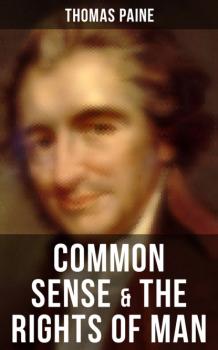Thomas Paine
Список книг автора Thomas PaineThomas Paine: Common Sense
"Perhaps the sentiments contained in the following pages, are not yet sufficiently fashionable to procure them general favor; a long habit of not thinking a thing wrong, gives it a superficial appearance of being right, and raises at first a formidable outcry in defense of custom. But the tumult soon subsides. Time makes more converts than reason. As a long and violent abuse of power, is generally the Means of calling the right of it in question (and in Matters too which might never have been thought of, had not the Sufferers been aggravated into the inquiry) and as the King of England hath undertaken in his own Right, to support the Parliament in what he calls Theirs, and as the good people of this country are grievously oppressed by the combination, they have an undoubted privilege to inquire into the pretensions of both, and equally to reject the usurpation of either."
The Greatest Works of Thomas Paine
Musaicum Books presents to you this meticulously edited Thomas Paine collection. This ebook has been designed and formatted to the highest digital standards and adjusted for readability on all devices. Content: Common Sense The American Crisis The Rights of Man The Age of Reason The Republican Proclamation To the Authors of «Le Républicain» To the Abbé Sièyes To the Attorney General To Mr. Secretary Dundas Letters to Onslow Cranley To the Sheriff of the County of Sussex To Mr. Secretary Dundas Letter Addressed to the Addressers on the Late Proclamation Address to the People of France Anti-Monarchal Essay for the Use of New Republicans To the Attorney General, on the Prosecution against the Second Part On the Propriety of Bringing Louis XIV to Trial Reasons for Preserving the Life of Louis Capet Shall Louis XVI have Respite? Declaration of Rights Private Letters to Jefferson Letter to Danton A Citizen of America to the Citizens of Europe Appeal to the Convention The Memorial to Monroe Letter to George Washington Observations Dissertation on First Principles of Government The Constitution of 1795 The Decline and Fall of the English System of Finance Forgetfulness Agrarian Justice The Eighteenth Fructidor The Recall of Monroe Private Letter to President Jefferson Proposal that Louisiana be Purchased Thomas Paine to the Citizens of the United States To the French Inhabitants of Louisiana A Letter Addressed to the Abbe Raynal The Life of Thomas Paine by Moncure D. Conway
Common Sense & The Rights of Man
This eBook edition of «Common Sense & The Rights of Man» has been formatted to the highest digital standards and adjusted for readability on all devices. Paine's visionary call for republicanism and social welfare was generations ahead of its time when «Rights of Man» was published. According to Paine – Government's sole purpose is safeguarding the individual and his/her inherent, inalienable rights; each societal institution that does not benefit the nation is illegitimate—especially monarchy and aristocracy. Human rights originate in Nature, thus, rights cannot be granted via political charter, because that implies that rights are legally revocable, hence, would be privileges. Common Sense was published anonymously on January 10, 1776, at the beginning of the American Revolution, and became an immediate sensation. Written in clear and persuasive prose, Thomas Paine marshaled moral and political arguments to encourage common people in the Colonies to fight for egalitarian government. It. Common Sense made public a persuasive and impassioned case for independence, which before the pamphlet had not yet been given serious intellectual consideration. He connected independence with common dissenting Protestant beliefs as a means to present a distinctly American political identity, structuring Common Sense as if it were a sermon. Historian Gordon S. Wood described Common Sense as «the most incendiary and popular pamphlet of the entire revolutionary era». Thomas Paine (1737-1809) was an English-American political activist, philosopher, political theorist, and revolutionary. One of the Founding Fathers of the United States, he authored the two most influential pamphlets at the start of the American Revolution, and he inspired the rebels in 1776 to declare independence from Britain. Paine's ideas reflected Enlightenment-era rhetoric of transnational human rights.
The Rights of Man
A classic work of The Age of Enlightenment, «The Rights of Man» is Thomas Paine's response to Edmund Burke's «Reflections on the Revolution in France». Central to the theme of «The Rights of Man» and The Age of Enlightenment is the idea that reason should be the foundation of authority and government. A classic work of early American literature, «The Rights of Man» greatly exemplifies the philosophy that America was founded upon.
The Age of Reason
Thomas Paine is a seminal figure in American History. An Englishman by birth, Paine immigrated to America in 1774 where he quickly took up the cause of the independence of the American colonies from England. His famous work «Common Sense» helped to gain great public support for the American Revolution and firmly established him as a central figure among the founding fathers. In «The Age of Reason» Paine turns his attention to a philosophical examination of Christianity. Within the work Paine lays the foundation of his Secularist Deist philosophy, which greatly influenced many of the founding fathers and the writing of the constitutional law of the United States of America.
Common Sense, Rights of Man and Other Essential Writings of Thomas Paine
English-American political activist, author, political theorist and revolutionary, Thomas Paine was one of the most influential figures during the period leading up to the American Revolution. Through his hugely influential pamphlet «Common Sense» and the series of pamphlets known collectively as «The American Crisis» he successfully advocated for colonial America's independence from the Kingdom of Great Britain. Those works are included in this collection along with «Rights of Man», «The Age of Reason», and «Agrarian Justice». In «Rights of Man» Thomas Paine responds to Edmund Burke's «Reflections on the Revolution in France» arguing that popular political revolution is permissible when a government does not safeguard its people and their natural rights. Paine became notorious for his «The Age of Reason,» in which he promotes reason and freethinking over the institutionalized doctrine of the Christian religion. Finally in his pamphlet «Agrarian Justice» he discusses the origins of property and introduced the concept of a guaranteed minimum income. In this edition we see a comprehensive collection of Paine's writings providing a window into his logic which heavily influenced early American political theory.
The Rights of Man
Originally published in two parts in 1791 and 1792, “The Rights of Man” is Thomas Paine’s defense of the French Revolution in response to Edmund Burke’s criticism in “Reflections on the Revolution in France.” A classic work of The Age of Enlightenment, “The Rights of Man” contends that reason should be the foundation of authority and government. Paine argues that any government that fails to protect the natural rights of its citizens should be opposed by political revolution. In accessible and simple language, Paine argues for the profoundly influential, and at that time, radical idea that civil liberties are not privileges granted by governments but arise naturally and belong to the people. Only governments that safeguard these rights are legitimate and should be allowed to exist. Those governments, such as the despotic French monarchy, that fail to do so must be overthrown. This brilliant and persuasive work is a spirited defense of representative government, written constitutions, and social reforms that benefit the working class. Over 200 years later, “The Rights of Man” remains an inspiring treatise on individual liberties and workers’ rights that is a must-read for all who value democracy and personal freedom. This edition includes a biographical afterword.
The Age of Reason
Thomas Paine, a seminal figure in American History, was an Englishman by birth who immigrated to America in 1774, where he quickly took up the cause of the independence of the American colonies from England. His famous work “Common Sense”, published in 1776, helped to gain public support for the American Revolution and established him as a central figure among the founding fathers. Later, while living in France during the French Revolution, Paine was dismayed by the increasing political radicalism of the revolutionary movement. In response he wrote the first part of “The Age of Reason” in 1794, with two more parts published in 1795 and 1807. In this influential and controversial work, Paine turns his attention to a philosophical examination of Christianity. Paine lays the foundation of his Secularist Deist philosophy and argues that God is real but that the Bible is not the word of God and is merely a human work that is flawed and inaccurate. Paine further contended that Jesus was not divine, rejected belief in miracles, and argued the world was governed by the laws of nature. Paine criticized organized religion as power hungry and corrupt and advocated for religious tolerance and freedom of thought. Accessible, clever, humorous, and far ahead of its time, “The Age of Reason” continues to resonate with readers today. This edition includes a biographical afterword.
Common Sense, Rights of Man, and Other Essential Writings of Thomas Paine
This volume collects together the most important writings of founding father Thomas Paine. First published on January 10, 1776, “Common Sense” was one the most influential and best-selling works from the colonial period. One of the central political arguments amongst the colonists of the pre-revolutionary period was whether or not they should seek freedom from British rule. In “Common Sense”, Paine provided a straightforward argument to the American people as to why they should seek independence. Second in this volume is “The Crisis”, a collection of pamphlets published during the American Revolutionary war which were meant to inspire the soldiers and reinforce the reasons for the fight. Third is the “Rights of Man” a refutation of Edmund Burke’s “Reflections on the Revolution in France” in which Paine argues that popular political revolution is necessary when a government does not protect the natural rights of its people. Fourth in this book is Paine’s “The Age of Reason”, a controversial work arguing for the philosophical position of Deism, which challenged institutionalized religion and the legitimacy of the Bible. Lastly there is the socialist treatise “Agrarian Justice”, in which Paine argues that land owners owe a rent to society in order to fund universal old-age and disability pensions as well as to provide a fixed sum to all citizens upon reaching maturity. This edition includes a biographical afterword.









